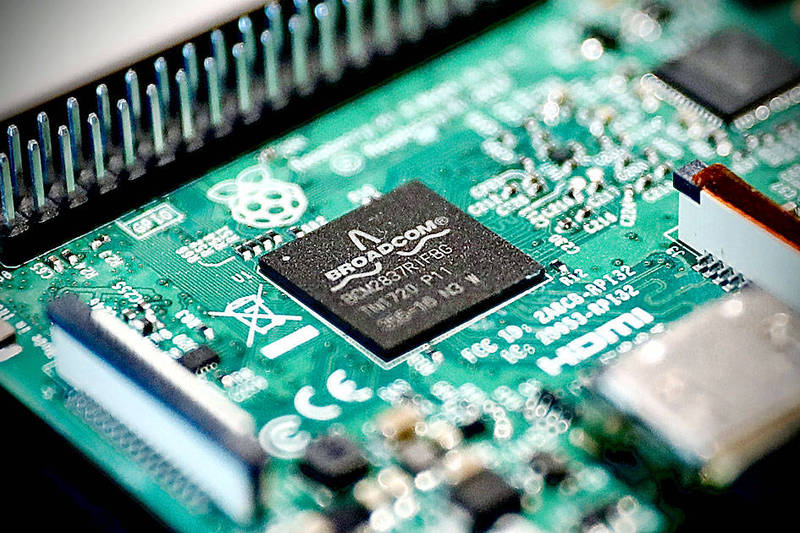A Broadcom microchip is on display at Hsinchu Science Park on Sept. 16.Photo: Ritchie B. Tongo, EPA-EFE
By Lisa Wang / Staff reporter
The production value of the local semiconductor industry is to grow 15.8 percent this year to NT$4.3 trillion (US$135.4 billion), following robust growth of 26.8 percent last year, the Market Intelligence & Consulting Institute (MIC) projected yesterday .
The institute attributed the strong performance to Taiwan Semiconductor Manufacturing Co's (TSMC, TSMC) sharp growth, which helped cushion the impact of an industrial slump due to shrinking demand for consumer electronics.
Taiwan's growth this year would outpace the global semiconductor industry's forecast annual expansion of 8.9 percent amid a drastic revision to projected shipments of notebook computers, smartphones and TVs, it said.
MIC cut its forecast for global notebook computer shipments this year by 10.76 percent to 199 million units.
Sagging demand for consumer electronics was deeply felt by local chip designers and manufacturers, MIC analyst Cynthia Yang told an online forum.
Taiwan's chip designers in the second quarter reported the first annual decline in production value in about two years — a 13.3 percent drop.
The best-case scenario for local chip designers is to report a flat production value this year compared with last year, as sluggish demand is compounding problems with high inventories, Yang said.
Memorychip makers would see a quarterly price decline of between 10 and 15 percent each quarter in the second half of this year due to oversupply, she said.
Increasing supply of NOR flash memory chips from China could undermine price quotes for this type of memory chips, she added.
However, local foundries, led by TSMC, would lend support to the nation's chip manufacturing industry, with production value expanding 26.5 percent year-on-year last quarter and 20.7 percent this quarter, although the growth is weaker than last year due to dwindling demand for 8-inch wafers in light of weak consumer electronics sales, MIC said.
The long-lasting chip crunch has improved significantly this year, but the supply of microcontrollers for vehicles and power management chips for industrial devices remains tight, Yang said.
Commenting on the impact of an escalating US-China trade row, Yang said Washington is stepping up its curbs on semiconductor and equipment exports to China, while the US is forming partnerships with Taiwan, South Korea and Japan to enhance its chip supply resilience through the CHIPS and Science Act and Chip 4 alliance, she said.
Against this backdrop, China is accelerating its efforts to upgrade semiconductor technologies and boost self-sufficiency, Yang said.
Chinese firms are likely to catch up with Taiwanese foundries within three to five years in supplying mature semiconductor technologies, she said.
Separately, Minister of Economic Affairs Wang Mei-hua (王美花) said in an interview published yesterday in Japan's Yomiuri Shimbun that semiconductor supplies would be disrupted if a contingency were to occur in the Taiwan Strait.
As Taiwanese makers account for a more than 60 percent share of the global foundry market, and Beijing relies on Taiwan for 36 percent of its semiconductor imports, any confrontation between the two sides would have a severe impact on China, Wang said.
News source: TAIPEI TIMES
